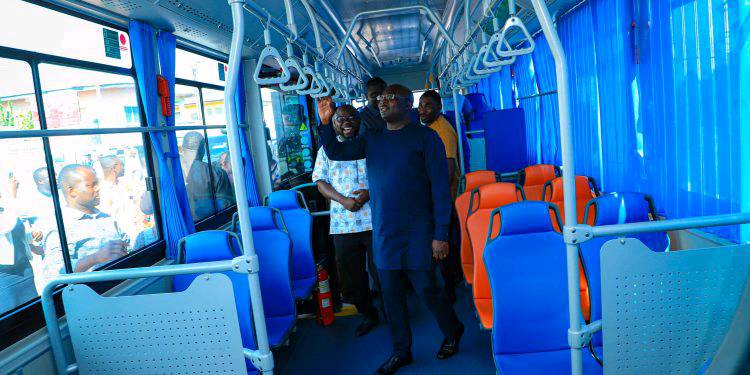In a significant step toward a sustainable and eco-friendly future, Ghana is setting its sights on electric vehicles (EVs) for public transport. Vice President Dr. Mahamudu Bawumia recently revealed that the government is diligently working on a policy framework to make this vision a reality.
Reducing Costs and Emissions
The primary motivation behind this initiative is to reduce the financial burden of transportation and combat carbon emissions. Dr. Bawumia rightly pointed out that the major components of transportation costs are fuel and spare parts. By transitioning to electric vehicles, Ghana aims to drastically cut these expenses. This shift has the potential to make public transport more affordable and accessible to a broader section of the population.
Moreover, embracing electric public transport aligns with global efforts to combat climate change. EVs are renowned for their lower carbon footprint compared to traditional internal combustion engine vehicles. This move by Ghana demonstrates a commitment to reducing greenhouse gas emissions and contributing to a cleaner, more sustainable environment.
SolarTaxi: Leading the Charge
During his announcement, Dr. Bawumia visited SolarTaxi, a Ghanaian startup that specializes in assembling electric vehicles. SolarTaxi is not just any company; it is the third-largest electric vehicle assembler in Africa, and its dedication to innovation is evident.
One of the standout achievements of SolarTaxi is its electric buses, capable of traveling over 200 kilometers on a single charge. This remarkable feat showcases the advancements in EV technology and their suitability for long-distance travel. Additionally, SolarTaxi has the ability to convert existing internal combustion engine vehicles into electric ones, making the transition to EVs even more accessible.
A Financial Boost
SolarTaxi is not only promoting green transportation but also offering financial solutions. The company, in collaboration with its bankers, provides financing for its electric motorcycles, cars, and buses without the need for collateral. The only requirement is a GhanaCard ID, making EV ownership more attainable for the average citizen.
Empowering the Youth and Women
One inspiring aspect of SolarTaxi's operations is its dedication to empowering young talent and women. The average age of employees at SolarTaxi is just 26, and an impressive 90% of their engineers are female. This commitment to diversity and youth employment sets a positive example for other businesses in the country.
**A Call to Action**
In light of these developments, Dr. Bawumia called upon major public transport providers like Metro Mass, STC, and Ayalolo to seize this opportunity and acquire more electric buses. This not only bolsters the nation's green efforts but also positions Ghana as a leader in sustainable transportation on the African continent.
Conclusion
Ghana's decision to embrace electric vehicles for public transport is a significant leap forward in the nation's journey toward sustainability. This initiative promises to make transportation more affordable, reduce carbon emissions, and stimulate innovation and employment, all while positioning Ghana as a role model for green transportation in Africa. As SolarTaxi and the government work hand in hand to develop this policy framework, the future of public transport in Ghana is looking brighter and greener than ever before. The sky is the limit, and indeed, it is possible.




No comments yet
Be the first to share your thoughts!